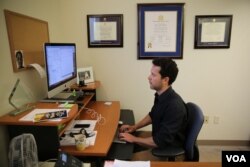Honduras native, Carlos and his 17-year-old son were nabbed after crossing the Rio Grande River into the U.S.
“We were walking after we crossed the river,” he told VOA in Spanish. “All wet. That’s when they detained us. We went to immigration, and they separated my son from me."
Carlos, who did not want to share his last name, was in detention for six days before he was released and reunited with his son. They plan to join relatives in Orlando, Florida.
In the meantime, they are learning what they can do to stay in the United States. When asked about asylum, Carlos did not understand what it meant — a common reaction among those VOA interviewed.
“I don’t know what I can do [to stay],” he said.
Assistance for asylum seekers
To help people like Carlos, the Texas Civil Rights Project has taken a front seat in coordinating with other allied organizations to direct people to immigration service providers and get them pro-bono legal representation in their immigration proceedings.
Lawyers at the project have also attended mass sessions at the Federal Court House in McAllen, Texas. They gather as much information as they can within the five to 10 minutes they have with those who were separated from their children and sent to court after being charged with criminal misdemeanors for illegal entry.
“We go through every interview, every parent who has been separated from a child,” Efren Olivares, a lawyer with the project, told VOA. “The vast majority of them, in McAllen anyways, are asylum seekers and fled their country escaping violence and threats,” he said.
No changes - yet
U.S. Attorney General Jeff Sessions recently announced changes to asylum regulations that would rule out claims made on the basis of "private" violence like spousal abuse and gang cruelty.
Those changes, if they have been implemented, have not affected the process in McAllen, where Carlos is basing his claim on gang violence.
“Here you’re free. …There’s a lot of evil over there. A lot of gangs,” Carlos said in Spanish.
Even if gang violence is still an accepted claim, Carlos’ chances of being granted asylum are slim. In 2016, for every one person who got asylum, 10 more didn’t.
Carlos left his wife and daughters in Honduras. On the way to the United States, he was robbed twice.
“A Mexican man took everything we had. It was a very hard moment,” he said.
Hidalgo County Republican GOP chairwoman Adrienne Peña-Garza told VOA the current asylum process is not working. She hopes Congress acts to improve things.
“People are using the asylum to get over here, but then at the same time there are those that truly are running away from terrifying situations,” she said.
Fixing asylum
A conservative Republican, Peña-Garza says the issue is complicated, but believes that it can be developed in “a more proper manner.”
“There are loopholes that are being abused, but at the same time we do want to be a compassionate country that is going to listen to the concerns of those that are in dire need. There has to be a balance there, and I haven’t seen it,” she said.
David Bier, immigration policy analyst at the libertarian Cato Institute, told VOA the United States has trained asylum officers to do the job of evaluating claims.
“[Trump] is really fundamentally calling asylum in United States a loophole and that is not the correct frame for what our asylum system is, which is ultimately about not repeating what we did during World War II, which was about sending people back to prosecution and death, but about creating a process by which we evaluate every claim individually and then adjudicate them on an individual basis,” he said.
At the moment, he says people who are trying to claim asylum legally by presenting themselves at ports of entry, are being turned away, a violation of both domestic and international law. The American Immigration Council has filed a lawsuit in a California court challenging the “unlawful practice of turning away asylum seekers who present themselves at ports of entry along the U.S.-Mexico border.”
“You have to address the issue of people trying to come the right way and make it easy for them to do so and that would ultimately fix the problem,” said Biers.
Carlos is at least getting his day in court. He and his son have been released from detention to join their relatives in Florida, pending an initial court hearing on June 27. They will be asked why they came to the United States illegally and be required to demonstrate a credible fear of going back.
If they manage that hurdle, they will be given another court date, likely some time well into the future. The immigration court system currently has a backlog of 700,000 cases.





